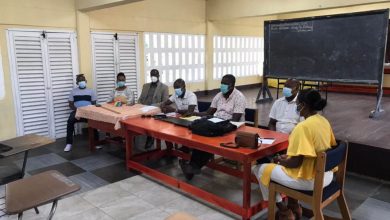Black Property Owners Say Abolish Third Party Transfer Program

As the de Blasio administration winds down, the City Council is trying to reform the Third Party Transfer program (TPT) – which the administration utilized under the guise of turning around “distressed” properties and creating more affordable housing. However, the initiative resulted in attempts to take millions of dollars in Black and Hispanic generational wealth out of historically Black but rapidly gentrifying neighborhoods.
Attorneys for three Black Central Brooklyn homeowners who filed a federal class-action civil rights lawsuit against the City stemming from TPT say the program should be abolished because it violates the Constitution’s Fifth Amendment, which states the government cannot take private property for public purpose without just compensation.
The issue was first brought to light by Kings County Politics (KCP), now PoliticsNY, in September 2018, when the city, through TPT, attempted to take the fully paid-off three-story brownstone of retired nurse, Marlene Saunders, 74, at 1217 Dean St. in Crown Heights, Brooklyn for a water bill of $3,792.20, which was actually paid. The property had been appraised at over $2 million.
Through an investigative series of over 30 stories, Kings County Politics documented more than 60 properties taken through TPT through “in rem” foreclosure proceedings. This ultimately led to a Kings County Supreme Court ruling in March 2019 that the City violated the U.S. Constitution in seizing six central Brooklyn properties without just compensation, and ordered the City return the properties to their rightful owners — restoring millions of dollars of intergenerational wealth in the Black and Latino community.
Under the TPT program, the city seizes properties they deem “distressed,” and in some cases slightly behind on sewer and water taxes, and gives them to the public/private non-profit Neighborhood Restore, who in turn give the property for a nominal fee to a qualified non-profit or for-profit developer. The program was created in 1996, when the city had a larger number of abandoned and neglected buildings.
However, with gentrification, these properties, and others in the same program, are now worth millions of dollars in market value. Almost all the properties highlighted in the KCP series were completely paid for with no mortgage and located in traditionally black and brown neighborhoods, which are becoming increasingly gentrified.
When the City takes property under TPT, they give no equity to the property owners — who, in many of the cases, paid thousands of dollars in back taxes and water bills to the Department of Finance, though it was never registered as being paid.
City Council Member Robert Cornegy Jr., whose central Brooklyn district had a number of TPT seizures, has been working with the city’s Department of Housing Preservation (HPD), which oversees the program, to reform it.
In a City Council hearing this week, Cornegy announced several proposed pieces of legislation to reform TPT, including creating an office of the homeowner advocate within HPD; revising the definition of a distressed property; and expanding notice requirements to property owners.
“The TPT Program, as designed in 1996, isn’t applicable to the NYC of today. I look forward to taking these ideas forward and ensuring we produce the fair-minded, thoughtful policy our city needs,” said Cornegy following the hearing.
“TPT has consistently robbed African American families of their homes but protecting them is easier said than done. Today we have shown that we have public servants and community activists willing and able to fix a complex problem dating back to 1996,” he added.
But attorney Matthew L. Berman, one of the plaintiffs’ attorneys with the law firm Valli Kane & Vagnini LLP, testified at the hearing that the TPT program is fundamentally flawed.
“What was interesting to me was the problems that the council is identifying are legitimate. What do you do with homeowners who are behind on their sewage bills on their water bills? What do you do when properties get run down? Some of these properties have tenants in them. You can have a landlord that’s neglecting the property. What do you do? You know, can’t we reform the TPT to take care of that? Well, no, you can’t because you have never fixed the fundamental flaw, which is that you’re not paying for what you take,” said Berman.
Berman said TPT is also no longer necessary because the city already has other measures to collect back taxes such as a tax lien sale, in which the city sells tax liens, but in this case once a property is sold at auction the homeowner gets paid just compensation value of the property. Similarly, when private property is taken under eminent domain, property owners are also paid the value of the property.
“HPD has now doubled down, asking the Council to pass a law that would make it close to impossible for owners to retrieve their properties from foreclosure, by tacking on repair charges, management, brokerage and other fees that are completely unrelated to any taxes owed. The proposed changes to the TPT amount to a last-minute attempt to try to blunt the impact of the lawsuit, instead of paying these wronged homeowners the money that they are owed, which may exceed a billion dollars,” said Berman.
Keith H. Wofford, another attorney representing the plaintiffs with the law firm White & Case LLP, became involved with the issue when he ran as a Republican against Letitia James for state Attorney General. He said under the current law, the City takes properties owned by Blacks and Latinos that have municipal charges of as little as $1,000 – without paying the homeowner a dime.
“Under the proposed new law, the City would still take Blacks’ and Latinos’ properties with minimal municipal charges – again without paying a dime. Both the old law and the proposed new law violate the Constitution, and the marginal changes in the new law do not change this fundamental fact — they just change the City’s cover story,” said Wofford.
“The ‘sunset’ provision for this law should not be in 2025, it should be now. We will continue to seek justice for the victims of this ‘program’ until the City stops violating the most basic and fundamental concepts of American law,” he added.




